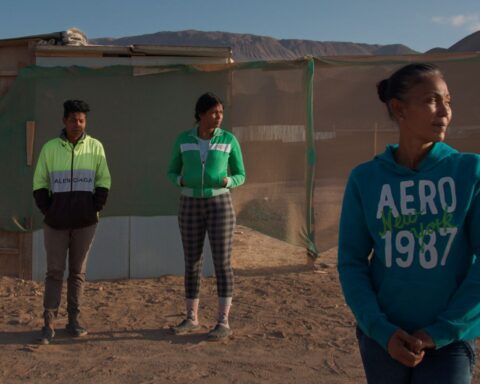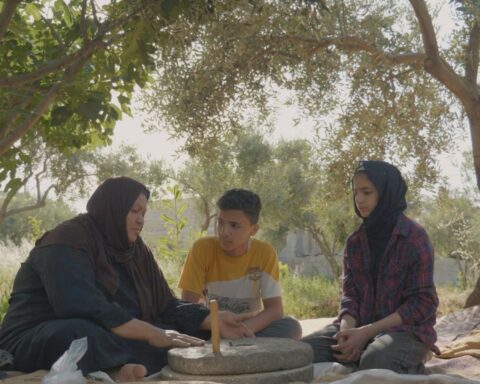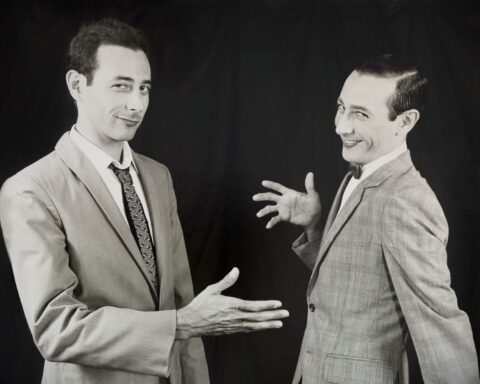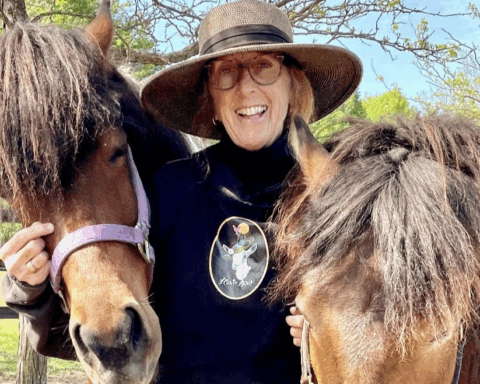The Wild Frontier (L’héroïque lande, la frontière brûle)
(France, 225 min.)
Dir. Nicolas Klotz and Élisabeth Perceval
On July 26, 2017, Human Rights Watch published a report on police abuses against migrants in Calais, France—a destination for refugees from Asia, Africa and the Middle East seeking passage to the UK—titled “Like Living in Hell.” By that time, the Calais Jungle, which reached a peak population of between 6 and 12 thousand during its almost two-year existence, had been cleared of all occupants and demolished.
As evidenced by both its English and French titles (The Wild Frontier or L’héroïque lande, la frontière brûle), Nicolas Klotz and Élisabeth Perceval’s latest film takes a different approach to representing the Jungle. But it’s not nearly as epic as its title (and its length) may suggest, nor as essayistic. To be sure, those characterizations aren’t inaccurate, and the film has those dimensions, but, in view of the final result, they seem inessential. What directorial philosophizing is present is ultimately eclipsed by the Jungle itself, and while this may seem to constitute an artistic failure (assuming the goal was a kind of essay on the refugee camp as frontier or as urban avant-garde, as the opening subtitles seem to announce), it’s this burying of directorial intent under the weight of its subject that makes The Wild Frontier a much better film than, say, Gianfranco Rosi’s Oscar-nominated Fire at Sea. While the latter obfuscates its subject (the migrant crisis as it manifests itself on the Italian island of Lampedusa) by overdetermining it, The Wild Frontier doesn’t spend enough time imposing structure and interpretation, making it a much more open work, and (therefore) a much better documentary. That said, it would be a better one if it left out the editorializing entirely.
Thankfully, either due to the unmanageability of the footage or a lack of commitment to the rhetorical project, it’s easy to forget that you’re watching an essay film and take it at its (documentary) face value. Over the film’s nearly four-hour running time there are very few interjections, only a few intertitles announcing chapters and some awkwardly sentimental non-diegetic music (sparingly employed—again, thankfully). The rest is testimony, and this is what makes the film both worthwhile and valuable—testimony not only of the prevailing conditions and everyday life in the camp, but also of numerous individual struggles of epic scope (crossings of deserts on foot, years of imprisonment, torture). This is what is epic in The Wild Frontier — not its length, but that the story of each individual inhabitant of the Jungle is an epic of which the Jungle is only a chapter.
On the viewer’s side, yes, it’s a very long film, but it’s difficult to be impatient when confronted with the limitless patience of the refugees, many of whom attempt every day for months upon months to cross the border—stowing away on trucks to be loaded onto ships bound for the other side of the channel—only to be caught and sent back to the Jungle to try again the next day. In a scene toward the end of the film, the Sisyphean character of their struggle is compounded when we hear one of the principal characters, Zeid, speaking on the phone after having made it across the channel by car after many months of attempts, proclaim finally, “Fuck England!” The film’s length, including, as an essential component, all of the discomfort that goes along with sitting in the cinema for 225 minutes, is ultimately to its advantage, forcing the viewer to assess their response in relation to what is being represented on the screen: an accidental community of individuals united by their potentially interminable quest for freedom, in which each successive horizon may reveal itself to be false.











